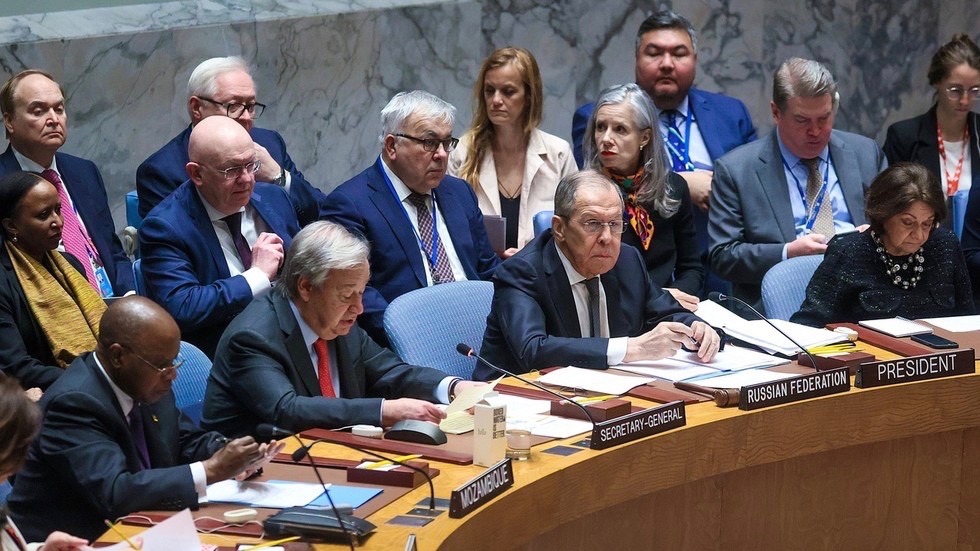A day-long open debate was held by the United Nations Security Council (UNSC) on Monday, April 24, on the challenges and need for effective multilateralism in global politics. The meeting was addressed by UN Secretary General António Guterres, as well as countries which are not members of the council.
In the meeting, several countries, including Russia and China, called out “a minority” of countries in the West for repeatedly violating the principles of the UN Charter for their narrow interests, giving birth to numerous conflicts and wars. It was highlighted that unilateral measures by such countries violate the principle of sovereign equality among UN members and the Charter’s focus on democracy as its method of functioning.
Countries asserted that in order to have effective multilateralism, it was necessary that all countries firmly follow the UN Charter and resist the urge for dominance and hegemony over others.
Speaking at the meeting, Guterres noted that in the context of rising tensions between major powers, “effective multilateral responses are urgently needed to prevent and resolve conflicts, manage economic uncertainty, rescue the Sustainable Development Goals, and counter challenges to global norms against the use and possession of nuclear weapons.”
Chairing the meeting, Russian Foreign Minister Sergei Lavrov claimed that the practice of unilateral actions including embargoes, financial sanctions, confiscation of property, destruction of critical infrastructure, and blocking the independent functioning of critical international organizations such as WTO and IMF, which have been adopted by some countries in the West under their so-called “rules-based order,” have placed the UN-led global system under a “profound crisis.”
Russia is the current chair of the UNSC.
Lavrov noted how the West’s “block-based approaches,” including recent groupings like AUKUS, undermine multilateral experiments like ASEAN, and threaten peace and stability in different parts of the world.
Responding to the criticism of Russia’s role in the Ukraine war, Lavrov noted that the issue “is not about Ukraine at all but about how international relations will be built in the future: via a solid consensus based on a balance of interests or via the aggressive and explosive promotion of [the West’s] hegemony.”
No unilateral sanctions
The Russian foreign minister noted that unilateral punitive measures have been adopted to maintain the hegemony of certain Western countries and “counter the natural process of establishing new, independent development centers.”
Condemning the practice, Lavrov asserted that “no one authorized the Western minority to speak on behalf of all of humanity. They should behave decently and respect all members of the international community.”
Participating in the debate, Chinese ambassador to the UN Zhang Jun criticized some countries’ practice of using unilateral sanctions, calling them illegal as per the UN Charter and outside the Security Council mandate. He noted that such practices are entirely for the maintenance of the hegemony, technology monopoly, and ideology of certain countries, CGTN reported.
Criticizing the West’s attempts to impose its rules over other countries by violating their sovereignty, Jun claimed, “there is only one order in the world, and that is the international order underpinned by international law.”
Several other countries including Russia, Iran, Venezuela, and Cuba criticized the growing use of unilateral punitive measures adopted by countries such as the US and its allies in the West.
Venezuelan representative Joaquin Perez Ayestaran, speaking on behalf of the Group of Friends in Defence of the Charter of the United Nations, called such measures “a new form of pretended domination and neo-colonialism.” These countries also asserted that such measures create and aggravate humanitarian crises, causing the untold suffering of millions of people in the poor and developing world.
Some countries also raised the issue of the UNSC being un-representative. They reiterated that the UNSC does not reflect the reality of the current world order and needs reforms. Raising the issue, Brazilian representative Joao Genesio de Almeida Filho pointed out that there is no representation from Latin America and Africa among the permanent members of the UNSC.
Lavorv said that Russia supported the need for reforms in the UNSC to give representation to Asian, African, and Latin American countries.





